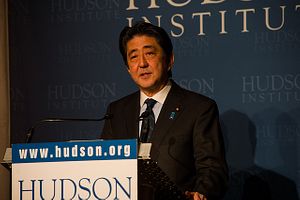Japanese Prime Minister Shinzo Abe has received a new warning on Abenomics: Fire more “third arrow” structural reforms, or risk losing popular support for change due to growing inequalities.
Amid increasing debate over the need for inclusive growth, the message from an International Monetary Fund (IMF) research paper has upped the ante on the Abe administration to deliver on its reform promises.
Written by Chie Aoyagi, Giovanni Ganelli and Kentaro Murayama, the March 13 paper states that the first two arrows of Abenomics, comprising expansionary fiscal and monetary policy, have helped Japan make “an initial escape from deflation.” But longer term, only “forceful implementation” of third arrow reforms to spur growth led by the private sector can ensure Abenomics’ success.
Shrinking Middle Class
While a soaring stockmarket and rising profits have benefitted the corporate sector, higher import costs and last year’s consumption tax hike have weighed on consumption. The previously widely held notion that “all Japanese are middle class” has become outdated, and should the perception spread that the benefits of Abenomics are not being shared fairly, public support could wane for much-needed reforms, the authors warn.
Japan’s once famous “100-million strong middle class” has suffered the effects of the post-bubble fallout, with income inequality going from the lowest level in the Group of Seven in the mid-1980s to reach the G7 average by 2010. Similarly, Japan’s relative poverty rate has risen to trail only the United States, with single-parent families and youth aged below 25 particularly disadvantaged compared to their wealthier elders.
Pension and welfare spending has reduced inequalities, particularly for the elderly, but this is a limited solution since government finances are already over-stretched due to the growing elderly population, low fertility rate, and rising dependency ratio.
In the labor market, the need for “Womenomics” reforms is shown by the female participation rate, which is about 20 percentage points lower than the male rate, with such low participation and underemployment of women costly in both income inequalities and potential growth. “This problem is compounded by the fact that the Japanese economy has been experiencing negative growth of labor input for years and is facing labor shortages in more recent years,” the authors state.
Meanwhile, the rise in the number of “non-regular” workers from less than 20 percent in the 1980s to above 35 percent by 2011 has exacerbated inequality while reducing productivity due to their reduced training and reportedly lower motivation. Women are suffering the heaviest burden since “more than half of employed women are non-regular workers, with less job security, lower wages and reduced career opportunities.”
According to the authors, “both inequality and relative poverty in Japan have increased in recent decades…[and] with the bulk of fiscal redistribution benefitting the elderly, the economic burden of rising inequality and poverty is concentrated in a disproportionate way on children, women and non-regular workers.”
According to the IMF’s Jonathan Ostry, rising inequality is a problem for policymakers since “more unequal societies have slower and more fragile economic growth.”
2% Target Vital
Bank of Japan Governor Haruhiko Kuroda is already under pressure over his 2 percent inflation target, but according to the IMF paper, the BOJ’s goal is crucial.
Should only the BOJ inflation target be achieved without any third arrow reforms, income equality would deteriorate with only limited gains in incomes. Worse, if monetary policy became “overburdened” due to a lack of structural reform and “runaway inflation” broke out, both growth and inclusiveness would suffer.
However, should inflation reach 2 percent and third arrow reforms such as higher female labor participation, reduced non-regular workers, and increased labor participation be achieved, Abenomics would improve average incomes as well as reducing inequality, the authors argue.
Priority measures for Abenomics include addressing labor market “duality” by improving conditions for non-regular workers, encouraging greater female workforce participation such as by increasing childcare availability, and boosting labor supply by fostering both foreign and older workers.
The overall result could see working-age households gain nearly 2 percentage points of GDP growth, with annual inclusive growth for all households 1.76 percentage point higher.
As the IMF authors conclude, “if all the arrows are fully launched, this policy framework can be effective in promoting both growth and income equality, therefore fostering inclusive growth.”
Tokyo is not short of reform ideas, with the Japanese government having flagged a number of policy changes, along with suggestions from bodies such as the OECD aimed at achieving a “self-sustaining” recovery. The IMF paper has given Abenomics another push along, and importantly one that could have a direct impact on the ruling coalition’s political longevity.

































